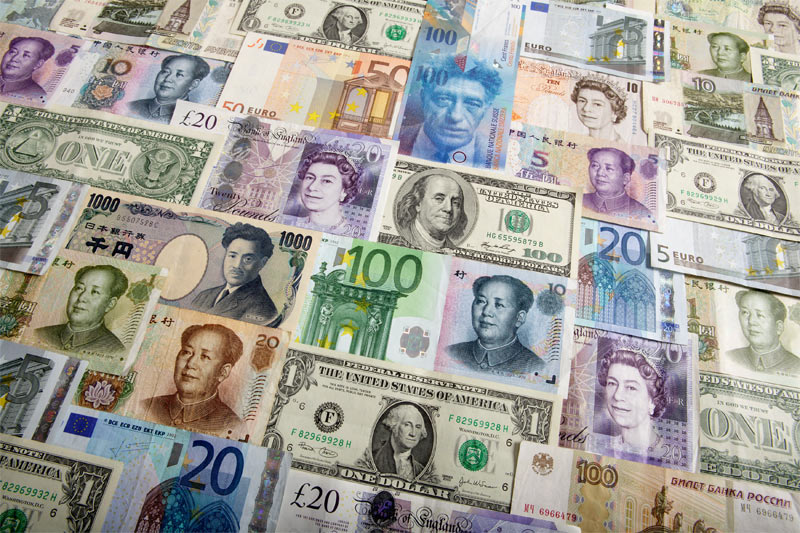Investing.com - The U.S. dollar rallied against the broadly weaker yen on Wednesday, but turned lower against the euro, as speculation that aid payments for Greece could be bundled into one large lump sum supported the single currency.
During European afternoon trade, the dollar turned lower against the euro, with EUR/USD up 0.19% to 1.2728.
The euro remained supported after German newspaper Bild reported Tuesday that Greece could receive three bailout installments in one single payment of EUR44 billion, citing German government sources.
The euro hit session highs against the greenback earlier after Italy saw borrowing costs fall to the lowest level since October 2010 at an auction of three-year government bonds.
But concerns that the economic outlook for the euro zone is worsening were underlined after official data showed that industrial production in the bloc tumbled 2.5% in September, compared to expectations for a 1.9% decline.
The greenback was little changed against the pound, with GBP/USD dipping 0.06% to 1.5862.
The Bank of England’s quarterly inflation report said that it will take until the third quarter of 2014 before inflation will fall below the bank’s 2% target, nine months longer than the bank forecast in August and added that growth looked likely to remain sluggish.
Earlier Wednesday, official data showed that the number of people in the U.K. claiming unemployment benefits rose by 10,100 in October, the largest increase since September 2011, but the unemployment rate ticked down to 7.8% from 7.9% in September.
Elsewhere, the greenback was sharply higher against the yen, with USD/JPY jumping 0.96% to 80.13, but was lower against the Swiss franc, with USD/CHF slipping 0.17% to 0.9457.
The yen came under selling pressure after Japan’s Prime Minister Yoshihiko Noda said earlier that he is willing to dissolve the lower house of parliament on November 16, setting the stage for elections in December.
The greenback was slightly lower against its Canadian, Australian and New Zealand counterparts, with USD/CAD edging down 0.10% to 1.0010, AUD/USD sliding 0.14% to 1.0418 and NZD/USD down 0.39% to 0.8126.
In New Zealand, official data showed that retail sales fell by 0.4% in the third quarter, disappointing expectations for a 0.5% rise, following a 1.3% increase in the second quarter.
The dollar index, which tracks the performance of the greenback versus a basket of six other major currencies, dipped 0.02% to 81.16.
Later in the day, the U.S. was to produce government data on retail sales, producer price inflation and business inventories. In addition, the Federal Reserve was to publish the minutes of its most recent policy-setting meeting.
During European afternoon trade, the dollar turned lower against the euro, with EUR/USD up 0.19% to 1.2728.
The euro remained supported after German newspaper Bild reported Tuesday that Greece could receive three bailout installments in one single payment of EUR44 billion, citing German government sources.
The euro hit session highs against the greenback earlier after Italy saw borrowing costs fall to the lowest level since October 2010 at an auction of three-year government bonds.
But concerns that the economic outlook for the euro zone is worsening were underlined after official data showed that industrial production in the bloc tumbled 2.5% in September, compared to expectations for a 1.9% decline.
The greenback was little changed against the pound, with GBP/USD dipping 0.06% to 1.5862.
The Bank of England’s quarterly inflation report said that it will take until the third quarter of 2014 before inflation will fall below the bank’s 2% target, nine months longer than the bank forecast in August and added that growth looked likely to remain sluggish.
Earlier Wednesday, official data showed that the number of people in the U.K. claiming unemployment benefits rose by 10,100 in October, the largest increase since September 2011, but the unemployment rate ticked down to 7.8% from 7.9% in September.
Elsewhere, the greenback was sharply higher against the yen, with USD/JPY jumping 0.96% to 80.13, but was lower against the Swiss franc, with USD/CHF slipping 0.17% to 0.9457.
The yen came under selling pressure after Japan’s Prime Minister Yoshihiko Noda said earlier that he is willing to dissolve the lower house of parliament on November 16, setting the stage for elections in December.
The greenback was slightly lower against its Canadian, Australian and New Zealand counterparts, with USD/CAD edging down 0.10% to 1.0010, AUD/USD sliding 0.14% to 1.0418 and NZD/USD down 0.39% to 0.8126.
In New Zealand, official data showed that retail sales fell by 0.4% in the third quarter, disappointing expectations for a 0.5% rise, following a 1.3% increase in the second quarter.
The dollar index, which tracks the performance of the greenback versus a basket of six other major currencies, dipped 0.02% to 81.16.
Later in the day, the U.S. was to produce government data on retail sales, producer price inflation and business inventories. In addition, the Federal Reserve was to publish the minutes of its most recent policy-setting meeting.
